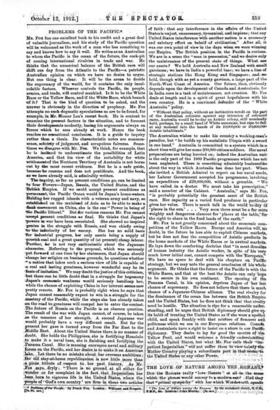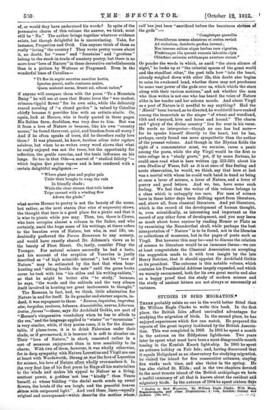TUB LOPE • OF NATURE 'AMONG THE ,,R0 DID the
Roinans really "lore -Neter° " at -ise the- ileum whieh 'the phrase would convey to naloddriszeattf .41tid time that Primal sympathy" with herwhieh Ifiroecisiverth apatite
•
• Ted LOOP :6:t :aiseng' the Romans.' By-Sir Aid' sly Taw:, tondowisdelneKVise .{9r.-act.) • ; 1,
of, or would they have understood his words ? In spite of the persuasive charm of this volume the answer, we think, must still be " No." The author brings together whatever evidence exists, but though delightful he is unconvincing. Take, for instance, Propertius and Ovid. Can anyone think of them as really "loving" the country ? They wrote pretty verses about it, no doubt, for " roses " and " fountains" and " grottoes " belong to the stock-in-trade of amatory poetry, but there is no more true "love of Nature" in these decorative embellishments than in a picture by Watteau or Fragonard. Even in the wonderful lines of Catullus-
" Ut flos in septis secretus nascitur hortis, Ignotus pecori, nullo contusus aratro, Quem mulcent aurae, &mat sot, educat
if anyone will compare them with the poem " To a Mountain Daisy " be will see at once that Burns loves the " wee modest, crimson-tipped flower " for its own sake, while the delicately reared nursling of "a closed garden" is valued by Catullus chiefly because it provides him with an artistic simile. Or, again, look at Horace, who is freely quoted in these pages. His Sabine farm, doubtless, was very dear to him. But was it from a love of Nature or because, like his own "country mouse," he found there rest, quiet, and freedom from all worry ? And if he often speaks of trees, did he therefore really love them ? It was pleasant, he knew, taciturn, silvas inter reptare" salubres, but when he so writes every word shows that what he really enjoyed was not the trees, but the opportunity for reflection, the gentle exercise, and the tonic influence on his lungs. So too in that Ode—a marvel of " studied felicity "- which begins Quo pinus ingens and is here rendered with a certain delightful negligence :— " Where giant pine and poplar pale Unite their boughs to wrap the vale In friendly shade ; While the clear stream that toils below Trips onward with a winding flow Adown the glade."
what moves Horace to poetry is not the beauty of the scene, but rather, as the next stanza (huc viva et unguenta) shows, the thought that here is a good place for a picnic and that it is wise to picnic while you may. Then, too, there is Cicero, who here occupies almost a column in the Index, and who certainly, amid the huge mass of his writings, at times refers to the beauties even of Nature, but who, in real life, un- doubtedly preferred the Forum Rornanum to any scenery, and would have exactly shared Dr. Johnson's views as to the beauty of Fleet Street. Or, lastly, consider Pliny the Younger. For natural science assuredly be had a taste, and his account of the eruption of Vesuvius is justly described as "of high scientific interest " ; but his "love of Nature" may be estimated by the fact that when boar- hunting and " sitting beside the nets " until the game broke cover he took with him " his stilus and his writing-tablets," so that he might be better able " to study," because, he says, "the woods and the solitude and the very silence itself involved in hunting are great incitements to thought."
The Romans, in fact, had, we think, little admiration for Nature in and for itself. In its grander and sterner aspects, in- deed, it was repugnant to them. "Reams, inguietus, improbus. ater, turgidus, ventosus, beluosus, dissociabilis, avarus, hibernus iratus, furens "—these, says Sir Archibald Geikie, are part of "Horace's vituperative vocabulary when he has to allude to the sea," and the language applied to " winter " or "mountains" is very similar, while, if they praise roses, it is for the dinner- table, if plane-trees, it is to drink Falernian under their shade, or if greensward, it is because it is soft to slumber on. Their "love of Nature," in short, consisted rather in a sort of sensuous enjoyment than in true sensibility to its charm. With two of them, however, it, was wholly otherwise, for in deep, sympathy with Nature Lucretius and Virgil are one at heart with Wordsworth. Strong .as was the love of Lucretius for science, his love of Nature often wholly overmasters it. In the very first line of his first poem he flings all his materialism to the winds and Makes his appeal to Nature as a living,
sentient power, goddess not less "kindly" " than Venus herself, at whose `bidding "the daadal earth sends -up sweet flowers, the leiels Of the sea laugh, and the peaceful heaven Antes with outpoured light.", And read these .dines;—esua.11y original and unsurpassed-:--which- describe the mother whose,
calf has just been "sacrificed before the beauteous shrines of the gods " "Completque querellis
Frondiferum Remus absistens et crebra revisit Ad stabulum, desiderio perflas. iuvenci ;
Nec tenerae Bailees atque herbae rore vigentes, Fluritinaque ills queunt summis labentia ripis Oblectare animism subitamque avertere curam."
Or ponder the words in which, as amid " the stern silence of night," he looks up at " the celestial spaces of the great world and the steadfast ether," the poet tells how "into the heart, already weighed down with other ills, this doubt also begins to raise its awakened head, whether there may not perchance be some vast power of the gods over us, which whirls the stars along with their various motions," and ask whether the man who thus writes is not one who has heard the voice of Nature alike in her tender and her solemn moods. And about Virgil as a poet of Nature is it needful to say anything ? Had the ".2Eneid" been burned, as he directed, he would still have ranked among the immortals as the singer " of wheat and woodland, tilth and vineyard, hive and horse and hound." The charm and " glory of the divine country " live for ever in his verse. He needs no interpreter—though no one has had more— for he speaks himself directly to the heart, but he has, perhaps, rarely found one more sympathetic than the author of the present volume. And though in the Elysian fields the sight of a commentator must, we surmise, cause a panic among the poets, while the shy Virgil would be the first to take refuge in a "shady grove," yet, if by some fortune, he could once read what is here written (pp. 313-320) about his own Studies of Waves, full as it is at once of fine feeling and acute observation, be would, we think, say that here at last was a mortal with whom he could walk hand in hand as being at once a lover of science, a lover of Nature, and a lover of poetry and good letters. And we, too, have some such feeling. We feel that the writer of this volume belongs to a class which is unhappily too rare. For men of science have in these latter days been drifting apart from literature, and, above all, from classical literature. And yet literature, which is the record of the development of human thought, is, even scientifically, as interesting and important as the record of any other form of development, and you may learn as much about homo sapiens by reading Homer or Plato as by examining the Neanderthal skull, while perhaps the best interpretation of " Nature" is to be found, not in the libraries or collections of museums, but in the pages of poets such as Virgil. But however this may be—and to discuss the relation of science to literature would be an immense theme—we can at least congratulate the Classical Association on accepting the suggestion made to it with true insight by the late Henry Butcher, that it should appoint Sir Archibald Geikie as its president. The outcome is this notable volume, which contains his Presidential Address largely expanded, and which we warmly recommend, both for its own great merits and also as a happy proof that the study of modern science and the study of ancient letters are not always or necessarily at variance.











































 Previous page
Previous page